|
|
|
Sort Order |
|
|
|
Items / Page
|
|
|
|
|
|
|
| Srl | Item |
| 1 |
ID:
103783
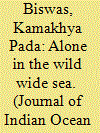

|
|
|
| 2 |
ID:
088066
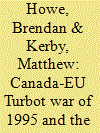

|
|
|
|
|
| Publication |
2009.
|
| Summary/Abstract |
This paper examines how and why in March 1995 certain elements of the Canadian government decided to take unilateral forceful action against foreign fishing off the Grand Banks and go against a long tradition of cooperation and multilateralism. In particular, it will address to what extent existing models of decision-making (in particular rational and bureaucratic models) adequately explain the process that went on in Ottawa at this time. The findings are that even though the bureaucratic politics model of decision-making can be used in a parliamentary structure like Canada, it is insufficient to explain Canadian decision-making processes during the Turbot War, and thus must be supplemented by a more inclusive cybernetic approach.
|
|
|
|
|
|
|
|
|
|
|
|
|
|
|
|
| 3 |
ID:
193191
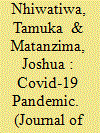

|
|
|
|
|
| Summary/Abstract |
Man-made reservoirs are constructed to meet certain purposes and Lake Kariba, Zimbabwe, was designed for hydroelectric power generation. However, it has developed other multiple uses, and the growth of fisheries on the lake has had a significant impact on the livelihoods of local communities. The declaration of Covid-19 as a pandemic in Zimbabwe in March 2020 was quickly followed by the imposition of national lockdowns with varying levels of severity up to the present day. This was done to curtail the spread of the disease, meanwhile enhancing the nation’s capacity in terms of acquiring testing kits, constructing more admission and quarantine centres as well as educating the people about ways to keep safe. In response to the calls by the government to monitor the movement of people and compliance of the lockdown rules, the Zimbabwe National Parks and Wildlife Management Authority (ZNPWMA), the governing body of the Lake Kariba fisheries, imposed rules that have significantly impacted the fishing communities at Lake Kariba. Both gillnet fishers and rod and line fishers have been impacted, but our focus here is on women rod and line fishers. Using the precarious livelihoods conceptual frameworks, we show how the changes in water management during the Covid-19 pandemic lockdowns has generated high levels of precariousness on the livelihoods of women at Kariba. We define precariousness as the condition of uncertainties brought to the women fishers by changes in water restrictions. The precarity of women was induced by several factors. For instance, the women fishers reported that restrictions to accessing fish in areas with high catches impacted them. They are also now obliged to pay exorbitant fishing fees in a way to discourage them to fish; they were frequently chased away from the Lake by ZNPWMA officers; they had limited amount of time to fish due to curfews; and failure to comply results in heavy fines imposed on them among other challenges. We show how these challenges interact with the current Zimbabwe socio-economic crisis to worsen the precariousness and vulnerability of women fishers at Lake Kariba. Data presented in this manuscript are based on participant observation and interviews with women fishers at Lake Kariba.
|
|
|
|
|
|
|
|
|
|
|
|
|
|
|
|
| 4 |
ID:
042097


|
|
|
|
|
| Publication |
Washington, U.S. Government Printing Office, 1980.
|
| Description |
vii, 540p.
|
|
|
|
|
|
|
|
|
|
|
|
Copies: C:1/I:0,R:0,Q:0
Circulation
| Accession# | Call# | Current Location | Status | Policy | Location |
| 024491 | 333.9516/US 024491 | Main | Withdrawn | General | |
|
|
|
|
| 5 |
ID:
039408


|
|
|
|
|
| Edition |
Rev ed.
|
| Publication |
Bombay, University Book Corporation, 1972.
|
| Description |
200p.Pbk
|
|
|
|
|
|
|
|
|
|
|
|
Copies: C:1/I:0,R:0,Q:0
Circulation
| Accession# | Call# | Current Location | Status | Policy | Location |
| 007656 | 910.33/BAR 007656 | Main | On Shelf | General | |
|
|
|
|
| 6 |
ID:
188217
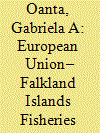

|
|
|
|
|
| Summary/Abstract |
This article analyzes fisheries relations between the European Union and the Falkland Islands from a legal perspective, paying special attention to the impact of the United Kingdom’s withdrawal from the European Union on the fishing carried out in this British Overseas Territory. Following a brief overview of the fishing conducted in these controversial waters and internationally disputed maritime zones, it examines European Union–Falkland Islands fisheries relations, first until 31 December 2020, and second in the wake of Brexit, with particular emphasis on those measures (mitigation and treaty based) that the European Union might take now that the United Kingdom is no longer a member.
|
|
|
|
|
|
|
|
|
|
|
|
|
|
|
|
| 7 |
ID:
163846
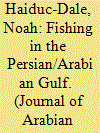

|
|
|
|
|
| Summary/Abstract |
The last two centuries have brought dramatic changes to the Persian/Arabian Gulf. Yet while imperial politics and newfound wealth altered much about coastal Gulf societies, fishing remained a remarkably steady enterprise. Rather than immediately changing alongside regionally altering events, fishing provided a stable livelihood for many Gulf coast residents throughout the eighteenth and nineteenth centuries, and even beyond the first half of the twentieth century. The main contention of this paper is that due to environmental limitations, the Gulf provided enough resources for local consumption, but not enough to justify large investment by foreign powers, such as the British Empire. This fact left local fishermen and political leaders in control of fishing. It also enabled fishermen to adapt to new technologies and markets at their own pace, rather than being compelled to do so by imperial powers. Even the twentieth century oil economy initially provided new markets for traditional fisheries rather than replacing them with industrial fishing fleets.
|
|
|
|
|
|
|
|
|
|
|
|
|
|
|
|
| 8 |
ID:
174879
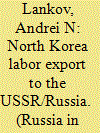

|
|
|
|
|
| Summary/Abstract |
The export of North Korean labor to Russia began in 1946 and continued, almost uninterrupted, until recently. The arrangements behind this labor migration project underwent dramatic revision from time to time, so we have to speak about three different periods: recruitment of North Koreans for work in fisheries in the 1940s and 1950s, dispatch of heavily controlled logging teams in the 1960s-1990s, and work of North Korean building crews, mainly on an autonomous basis, since the late 1990s. These periods reflect the way relations between the two states have been developing, and the change of their political concerns and interests. However, the underlying rationale has not changed much over the decades: the Soviet/Russian state needed cheap and docile labor, while the DPRK needed an additional source of hard currency and North Koreans were enthusiastic about getting lucrative job opportunities. On balance, both sides have been able to get what they hoped to get, and this has ensured the project’s long life.
|
|
|
|
|
|
|
|
|
|
|
|
|
|
|
|
| 9 |
ID:
157792


|
|
|
|
|
| Summary/Abstract |
This article takes issue with approaches to the dispute between Sri Lanka and India over fishing rights in the Palk Bay which couch the issues in terms of ‘legal pluralism’. It argues that in this context the concept of legal pluralism as dangerously anodyne, effectively marginalising issues of power. In this and in the wider context of South Indian fisheries legal pluralism presents specific narrow claims as if they were wider systems, and falsely reifies ‘tradition’ and ‘custom’. More generally, this article suggests that the focus on ‘fishing’ is misleading in two related senses. First, it equates two rather different forms of activity – small scale artisanal fishing where the owner and the operator are usually the same person, and capital-intensive trawler fishing where there is a distinction between the owner and the workers. Second, it falsely isolates fishing per se from other forms of economic life and fails to understand that the drivers which determine the ways in which maritime resources are exploited must be understood within that wider political economy.
|
|
|
|
|
|
|
|
|
|
|
|
|
|
|
|
| 10 |
ID:
164061
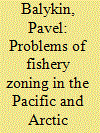

|
|
|
|
|
| Summary/Abstract |
This article notes the importance of food security and the serious lag of this industry in recent years. This, according to the author, is largely due to miscalculations in the modern scheme of fishery zoning. The article proposes to update the fishery zoning of the country's seafood supply as a factor of modern methods of marine spatial planning. It also touches on the problems of international rivalry and interaction, including the development of the Northern Sea Route and the prospects of its use in the context of the Maritime Silk Road project of the 21st Century.
|
|
|
|
|
|
|
|
|
|
|
|
|
|
|
|
| 11 |
ID:
106525
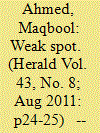

|
|
|
|
|
|
|
|